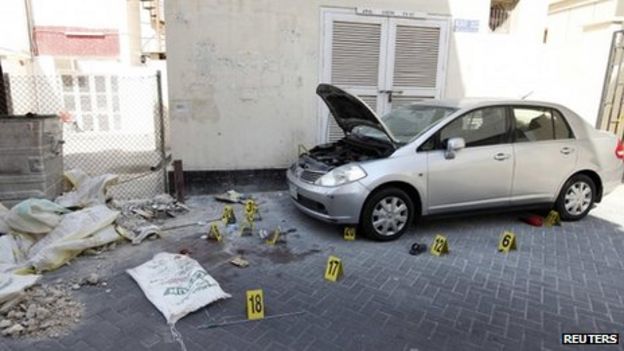Bahrain’s government has revoked the citizenship of 31 opposition activists for “undermining state security”.
An interior ministry statement published by state media said Article 10 of the Citizenship Law permitted the “re-evaluation of nationality”.
Those affected include Jawad and Jalal Fairuz, former MPs for the leading Shia movement, al-Wifaq, and Ali Mushaimaa, son of al-Haq’s imprisoned leader.
Last week, the government banned all public gatherings and rallies.
Interior Minister Sheikh Rashid Al Khalifah said “repeated abuse” of the rights to freedom of speech and expression could no longer be accepted.
However, the UN said the restrictions “could aggravate the situation in the country” and urged the government “to lift them without delay”.
There has been widespread unrest in Bahrain since demonstrators took to the streets of Manama in February 2011, demanding more democracy and an end to what they said was discrimination against the majority Shia Muslim community by the Sunni royal family.
‘Punishment for dissent’
Matar Matar, a former MP and leading member of al-Wifaq, told the AFP news agency that many of the activists whose citizenship was revoked on Wednesday had been acquitted by a military court last year after being charged with harming state security.
The list also includes Said al-Shihabi, head of the Bahrain Freedom Movement, and three Shia clerics – Hussein Mirza, Khaled Mansour Sanad and Alawi Sharaf.
Information Minister Samira Ibrahim bin Rajab told BBC Arabic that the activists had “all contributed to, and worked for, breaching national security and damaging the supreme interests of Bahrain”.
“They are all members of banned parties which work to topple the regime. They are members of the so-called Islamic Front for the Liberation of Bahrain, which was established in Iran,” she said. “They have connections with the Iranian embassy and some work inside there.”
Bahraini officials suspect Iran has been training Shia opposition activists in the Gulf kingdom, but an independent investigation found no evidence it was responsible for last year’s unrest.
The Bahrain Youth Society for Human Rights (BYSHR) and the Bahrain Centre for Human Rights (BCHR) expressed their “grave concern” at the citizenship move, saying in a joint statement that the authorities had not provided any evidence.
“It is apparent that the action taken by the Bahraini authorities to revoke the citizenships of 31 individuals is intended to punish them for expressing peaceful dissent and thereby intimidate others from exercising their right to freedom of expression,” the statement added.
Amnesty International said the authorities were making some stateless.
“This, as well as any arbitrary deprivation of nationality, is prohibited under international law,” said Philip Luther, the human rights group’s Middle East and North Africa director.
The interior ministry statement said the activists’ citizenship would be revoked “in conformity with the kingdom’s commitments under international law” and that those affected would have the right of appeal.
Hezbollah accused
In a separate development on Tuesday, the authorities announced that four suspects had been arrested in connection with bombings in the capital, Manama, the previous day which killed two foreign workers and seriously injured another.

The chief of public security, Maj Gen Tariq al-Hassan said the suspects, who were not identified, had been taken into custody and that further arrests were possible.
The official Bahrain News Agency quoted Ms Bin Rajab as saying the bombings “bear the hallmarks of the Hezbollah terrorist organisation”.
The Lebanese Shia Islamist movement “trains and guides terrorist groups to implement such attacks according to a clearly set method”, she added.
“What we are going through today is the escalation ‘promised’ by al-Wifaq chairman Ali Salman, who stated once that ‘this is part of what we can do, and we are capable of doing even more’,” Ms Bin Rajab claimed.
On Wednesday, a statement by six opposition groups – including al-Wifaq – condemned “all forms of violence, regardless of its source”.
Source: http://www.bbc.co.uk/news/world-middle-east-20235542
 ..
..